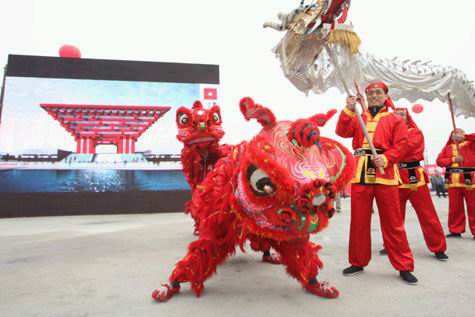
Dragon dancers perform before a billboard featuring the
China Pavilion at Shanghai Expo 2010 yesterday to mark the beginning of its
construction. - Shanghai Daily
Shanghai Daily news
World Expo Shanghai organizers unveiled a red, traditional design for the
China Pavilion as construction on the structure started yesterday.
The
design was chosen from 344 entries from all over the world. The final design was
by a joint team from South China University of Technology and Tsinghua
University.
The budget for the pavilion is about 1.5 billion yuan (US$203
million), Ding Hao, deputy director of the Bureau of Shanghai World Expo
Coordination, told the press conference after the kicking-off
ceremony.
The structure is named "the Crown of the East" as its most
distinct feature is its roof. It will be made of traditional dougong brackets,
which were in use more than 2,000 years ago and are a feature of some buildings
in the Forbidden City and the Summer Palace in Beijing.
The six-layer
dougong roof, some 30-meters high, is the exhibition area of the Chinese
national pavilion. The 20,000-square-meter exhibition will have the theme
"Chinese wisdom in urban development" and will tell visitors about the Chinese
values of harmony, nature and spirit.
The top of the roof features a nine
plus nine or sudoku grid, which was a traditional urban planning feature in
ancient Chinese cities such as Xi'an and Beijing.
Four 20-meter pillars
supporting the roof rise from the top of the 13-meter-high provincial joint
pavilions. The landscaping in the China Pavilion area will be in the
Jiangnan-garden style, seen in cities such as Yangzhou or Suzhou, both in
Jiangsu Province.
Environment and energy-saving strategies have also been
considered in the design, said Dai Liu, president of the Expo Group. For
example, the organizers are considering using solar-energy materials to cover
the walls of provincial pavilions.
After the six-month Expo, the China
Pavilion will become another landmark in Shanghai and host exhibitions featuring
Chinese culture and history, said Dai.
The China Pavilion, covering an area of 6.52 hectares, is in the core area of
the Expo site in Pudong.
It is the third permanent pavilion to have
begun construction, following the Expo Center and the Expo theme pavilion. Work
on the fourth, a performance center, will start next week.
The China
Pavilion includes a national pavilion, a joint pavilion for provinces and cities
and separate pavilions for Hong Kong, Macau and Taiwan. Provinces and cities in
the joint pavilion will have a 600-square-meter space.



